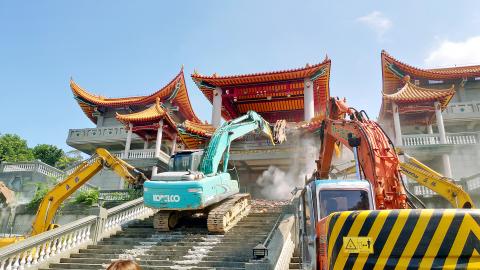The Changhua County Government yesterday demolished a former temple that had been converted into a shrine to the Chinese Communist Party (CCP), while the owner protested by raising aloft the Chinese flag a final time.
Wei Ming-jen (魏明仁), a contractor and former military officer, bought the property and used it as a conduit of Chinese influence and his own interests, an official said Tuesday on condition of anonymity.
The temple was ordered demolished and its water and power supplies cut by the county on Friday last week. Changhua County Deputy Commissioner Lin Ming-yu (林明裕) yesterday oversaw the demolition work, which he ordered to commence at 10:05am.

Photo: Chen Kuan-pei, Taipei Times
The county said Wei would be responsible for paying the NT$5 million (US$162,882) cost for demolition, adding that the work would take one week to complete.
On Tuesday, about 20 people showed up to support Wei, who wore a People’s Liberation Army uniform during the flag raising.
Wei told his supporters that the demolition had historical significance, adding that the communists would “rise up again at their base in Ershuei (二水)” — the township where the property is located.
Wei ended his speech by chanting: “Long live the Chinese Communist Party. Long live the teachings of Mao Zedong [毛澤東]. Long live the People’s Republic of China.”
He said his supporters should trust him, because their “great China dream would one day be revived.”
Before the demolition began, Wei raised the Chinese flag at the temple, gathered his belongs and left, accompanied by members of the pro-unification Concentric Patriotism Association (愛國同心會).
The nearly 100-year-old temple originally served as a place of worship for local Buddhists. The temple had hired Wei to build an expansion, but later lost the building to him due to a property rights dispute.
Wei kicked out the nuns residing at the temple and replaced Buddhist statues with images of Mao, Chinese President Xi Jinping (習近平) and other CCP icons.
The Changhua County Cultural Affairs Bureau said the temple was built in 1922 and expanded in 2002.
The temple had agreed to pay NT$70 million for the expansion, but as the work progressed, Wei increased the cost to NT$90 million, which the temple was unable to afford, the bureau added.
Wei took the case to court, where it was tied up for nearly 10 years.
The Changhua District Court ordered the temple be auctioned off.
Wei’s remodeling of the temple with CCP propaganda and Chinese flags caught media attention, with the New York Times running a feature story on Sept. 19.
The nuns have been forced to live as squatters in a makeshift shack next to the property, the temple priest said, adding that he hopes “everyone can help rebuild the temple someday.”
Democratic Progressive Party (DPP) Changhua County Councilor Hsu Shu-wei (許書維) said he was grateful to Changhua County Commissioner Wei Ming-ku (魏明谷) for taking the lead in having the temple demolished, but added that only in deciding who had the rights to the land would justice be served.
At a news conference yesterday, China’s Taiwan Affairs Office spokesman An Fengshan (安峰山) said: “This clearly demonstrates the DPP’s indulgence of Taiwan-independence activities while it attacks and persecutes Taiwanese who advocate unification.”
Additional reporting by Chung Li-hua

Conflict with Taiwan could leave China with “massive economic disruption, catastrophic military losses, significant social unrest, and devastating sanctions,” a US think tank said in a report released on Monday. The German Marshall Fund released a report titled If China Attacks Taiwan: The Consequences for China of “Minor Conflict” and “Major War” Scenarios. The report details the “massive” economic, military, social and international costs to China in the event of a minor conflict or major war with Taiwan, estimating that the Chinese People’s Liberation Army (PLA) could sustain losses of more than half of its active-duty ground forces, including 100,000 troops. Understanding Chinese

The Ministry of Foreign Affairs (MOFA) yesterday said it is closely monitoring developments in Venezuela, and would continue to cooperate with democratic allies and work together for regional and global security, stability, and prosperity. The remarks came after the US on Saturday launched a series of airstrikes in Venezuela and kidnapped Venezuelan President Nicolas Maduro, who was later flown to New York along with his wife. The pair face US charges related to drug trafficking and alleged cooperation with gangs designated as terrorist organizations. Maduro has denied the allegations. The ministry said that it is closely monitoring the political and economic situation

‘SLICING METHOD’: In the event of a blockade, the China Coast Guard would intercept Taiwanese ships while its navy would seek to deter foreign intervention China’s military drills around Taiwan this week signaled potential strategies to cut the nation off from energy supplies and foreign military assistance, a US think tank report said. The Chinese People’s Liberation Army (PLA) conducted what it called “Justice Mission 2025” exercises from Monday to Tuesday in five maritime zones and airspace around Taiwan, calling them a warning to “Taiwanese independence” forces. In a report released on Wednesday, the Institute for the Study of War said the exercises effectively simulated blocking shipping routes to major port cities, including Kaohsiung, Keelung and Hualien. Taiwan would be highly vulnerable under such a blockade, because it

UNRELENTING: China attempted cyberattacks on Taiwan’s critical infrastructure 2.63 million times per day last year, up from 1.23 million in 2023, the NSB said China’s cyberarmy has long engaged in cyberattacks against Taiwan’s critical infrastructure, employing diverse and evolving tactics, the National Security Bureau (NSB) said yesterday, adding that cyberattacks on critical energy infrastructure last year increased 10-fold compared with the previous year. The NSB yesterday released a report titled Analysis on China’s Cyber Threats to Taiwan’s Critical Infrastructure in 2025, outlining the number of cyberattacks, major tactics and hacker groups. Taiwan’s national intelligence community identified a large number of cybersecurity incidents last year, the bureau said in a statement. China’s cyberarmy last year launched an average of 2.63 million intrusion attempts per day targeting Taiwan’s critical